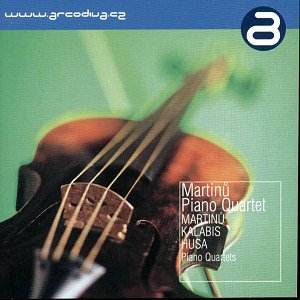Arco
Diva is steadily building up an impressive body of discs and its
greatest strength is in native chamber works. Here we have three
Czech Piano Quartets played by one of the best such groups around,
one that has as its pianist the distinguished figure of Emil Leichner
(who has recorded Martinů’s complete solo piano music for
Supraphon. Ed.). It’s appropriate that the disc opens with the
quartet’s eponymous hero, Martinů, and his 1942 work written
in Long Island. The tense, striving Poco Allegro is delineated
with clarity by these players. The writing may be in Martinů’s
avowedly motoric style, and with somewhat less individuality than
elsewhere, but you’d not really know it from the performance.
They bring real lyrical intensity to the Adagio, the piano only
joining his string colleagues half way through the movement, applying
fresh, rippling figuration amongst the folk-like impress. Leichner,
by contrast, takes advantage of the piano’s renewed prominence
in the finale by virtue of his imposing and noble playing, richly
chordal and romantic. The melodies are here of real elasticity,
lines are clear and the group take this movement as asked, at
a real Allegretto poco moderato.
Viktor
Kalabis wrote Ludus for these players who first performed the
one movement twelve and a half minute work in 1998. It’s tightly
constructed and full of light and shade. Kalabis balances sections
with accustomed acumen, the abrasive with the lyrical and he can
also dance with Martinů-like freedom and surge, as he does
here albeit briefly. The meditative sections and the strenuous
unison writing for strings end in reflection, not quite affirmation.
Finally there is Karel Husa’s Variations. Husa has long been resident
in America and the Variations, written in 1984, consist of a series
of variations on the sound of a bell. This is a substantial twenty-minute
multi-partite work that proves more and more invigorating the
more one delves into its riches. Though tonal it opens toughly
and cultivates some intriguing sonorities – the piano and string
sonorities in the First Interlude for example and the heavy-lidded
elusive writing surrounding it. Then there are the insistent,
almost frantic, bell sonorities of the pensive Adagio, the shuddering
Prestissimo section and the elliptical, quizzical ending. It’s
jam packed with colour and ear titillating sonorities; it also
embraces a wide range of moods and throws up puzzles of tone and
mood – well worth getting to know in fact.
A
warm welcome to this disc. It has the accustomed good notes and
attractive presentation. More than that it has fine music cogently
performed.
Jonathan
Woolf
The
Arcodiva catalogue is now offered by MusicWeb

![]() for
details
for
details